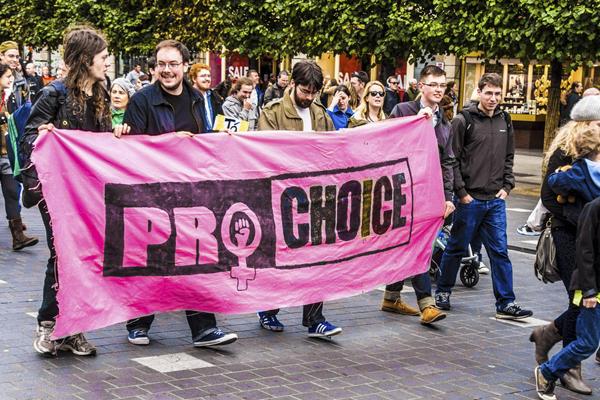Versus: Pro-Choice and Pro-Life
February 23, 2016
With the approaching election, the conversation of abortion has made its way into debates. This argument of differing opinion sparks conversation and gives support to those political figures that share in voters’s opinion on this controversial issue.
Pro-Choice
The limitations of human rights are often called into question when the concept of abortion is brought up. Abortion is a heavy topic, as it highlights the question of if our bodies are truly our own, and if we really do have free will. It provokes the discussion of who is deserving of rights and why. I believe in every woman’s right to terminate her pregnancy if she chooses to do so, and that every woman should have this option available to her.
I’m pro-choice largely because I truly believe a fetus does not meet the requirements of a “human being,” and therefore is not deserving of the same rights. A fetus cannot survive on its own, and is completely dependent on the mother’s body. Only at the point of 24 weeks is the state of “fetal viability” reached, where the fetus is able to survive outside the body. After that time frame, the fetus viability still cannot be guaranteed, and neither can its quality of life.
Automatically assuming a fetus has a “right to life” implies it takes precedence over the mother’s right to her own body, and suppresses her will to choose. Are women afforded less rights than that of a fetus?

“Constitutional personhood” refers to “a human being or legal entity with some or all constitutional rights.” The legal definition of a person is “an entity who can, under common law or statutory law, hold and sell property, and sue or be sued.” Boethius, a Roman philosopher, defined a person as “an individual substance of rational nature.” John Locke, an English philosopher, defined a person as “a thinking intelligent Being, that has reason and reflection, and can consider itself as itself.” A fetus may meet the definition for “life,” but does not meet the definition for being a “person,” and should not be allowed the same rights as people.
The option of abortion can also provide relief for women who become pregnant after being assaulted and do not want to go through with the pregnancy. According to the National Sexual Violence Resource Center, 1 in 5 women will be raped at some point in their life. Should 20% of women be forced to worry about carrying an unwanted child conceived as an act of violence? Women should not have to live with the permanent consequences of something that was not of their will. Forcing them to bring to term a pregnancy caused by sexual assault is just another forced assault on that woman.
People often argue that abortion is just a way for women to avoid the responsibility of children, and that if they really didn’t want to get pregnant they wouldn’t have had sex in the first place. Putting the blame on women by saying pregnancy is the woman’s responsibility demeans motherhood, and defines it as nothing more than an inconvenience. Children should not be used as a punishment for sex, as it turns it into something “bad” that is deserving of punishment.
Guilt-tripping women into giving birth doesn’t allow the child to be born into the circumstances it deserves. Having a child requires proper consideration, and no child should come into this world unwanted. Unwanted pregnancy has been linked to the development of depression and anxiety in women, and women who are forced to carry out an unwanted pregnancy have been found to suffer more serious complications during childbirth compared to the level of complications women who had an abortion experienced.
Beyond that, consenting to sex does not automatically mean a woman consented to get pregnant, and not all women have easy access to the proper contraceptives necessary to prevent pregnancy, or are even taught how to use them. Contraceptives also are not a fail-proof system, so a woman could take all the correct precautions in order to prevent pregnancy and it might not be enough. In that case, is the fault still hers?
Abortion isn’t just “looking for a way out.” If someone knows they can’t provide for their child, abortion could be considered the more responsible decision. Of women who have abortions, 42% are below the federal poverty level.
Abortion is a common practice all over the world, whether it’s outlawed or not. One half of abortions performed today are illegal, and every 7 minutes a woman dies from an unsafe abortion. Outlawing abortion only leads to more unsafe abortions, and will put more women’s lives at unnecessary risk. We have to ensure women are provided a safe way to terminate their pregnancies.
The most common argument from the pro-life community is centered around religion. The concept of the beginning of human life is philosophically and religiously based. It is an opinion, and you can’t enforce laws based on religious beliefs and personal opinions. Religious arguments have no place in the law, thanks to our separation of church and state.
The debate isn’t whether life begins at conception, it’s whether personhood begins, and I believe it doesn’t. We can’t deny or limit the defined rights of a fully grown human being in order to afford rights to a fetus, whose personhood is both debatable and rooted solely in theory and speculation.
Pro-Life

Abortion: a popular topic for discussion, especially as the 2016 election for presidency will be held in November. The question lies in whether it should be legal or not, or even more importantly, if abortion can be thought of as moral. This debate starts where the rights of a human being begin and where they end. I believe that all people deserve equal rights, even those not yet born.
I am pro-life because I believe that an unborn child becomes a human being from the moment of conception until the moment of natural death, and should have all the rights available to other living, human beings. There shouldn’t be a magical moment when a clump of cells becomes a baby. A baby lives from the moment of conception and should be treated as such.
For this to be accurate, a fetus must first be proven as a living being, and not just a living organic part formed from a clump of cells. There are seven characteristics of life, as defined by scientists: The ability to maintain homeostasis, to have cellular and molecular organization, to have a metabolism, to be growing, to be able to adapt, to respond to stimuli, and to be able to reproduce. Temperature and nutrition levels are maintained by the fetus, proving that they can maintain homeostasis. The fetus is organized: composed of cells and has all the DNA from conception necessary for the development of the child. They have their own metabolism. They are able to adapt to and remember sounds. They can respond to pain. The embryo cannot reproduce any more than a toddler can, but just as with a baby born, they will be able to with time and growth, so they should be considered alive.
Online Medical Dictionary defines a person as a “living human being,” so a fetus, as a human being which has just been proven to be alive, counts as a person. In the end, different websites and sources will contradict each other on the true definition of what a person is. The reader needs to decide which is more credible, and whether a legal definition, set in place for the convenience of law making, can override a medical one, set by years of research and study.
Other sources from scientists include Dr. Bradley M. Patten’s textbook, Human Embryology, which states “Contraception marks the initiation of a life of a new individual” and Dr. Alfred M. Bongioanni, who said, “I have learned from my earliest medical education that human life begins at the time of conception. I submit that human life presides throughout this entire sequence from conception to adulthood and that any interruption at any point throughout this time constitutes a termination of human life.”
And so, a fetus counts as a living, human being. But still, abortions serve to be convenient and protect the mother and her rights, especially when she was placed in unfavorable circumstances, such as a rape or incest-induced pregnancy, or when her health rests on the line. But only about 1% of all abortions are “Hard Case Abortions” such as these, so they do not justify the remaining 99% of abortions.
But even still, abortions cannot be justified even in hard case situations. A child should not have to pay for their father’s crime if the mother becomes pregnant after being raped, or if the parents engage in incestual relations. Please note that if a fetus was consequently terminated through the secondary effect from medical treatments to preserve the mother’s health or life, this does not constitute as an abortion.
The fetus can be legally aborted until week 24 in the pregnancy. But after just 8 weeks, all of its major organs are functioning, and it can recoil from pain- including the pain inflicted during abortions. At 21 weeks, still before the point where abortions become illegal, the baby can live outside of the womb with just a little help. Abortions, especially after the point at which a baby can feel and react to pain, are inhumane.
But the convenience of an abortion often seems to override the inhumanity of them, as we see how many women get an abortion every year- roughly 1.2 million every year. When a fetus has its own genetic code, DNA, blood type, functioning organs, and dreams, the killing of a fetus is nothing but the decimation of a human life for the sake of convenience. The mother does not have the right to convenience over the fetus’ right to life. And she shouldn’t. The environment, level of dependency, and size and appearance should never be the qualifiers on whether or not a child has the right to live or not.
The ideology that women can do anything they would like to do with their body needs to be considered morally incorrect. For example, prostitution: if a woman can do whatever she chooses with her body, this would become morally acceptable. It may be her own body that the woman prostitutes, but this spreads diseases and closely connects with human trafficking. Just as the fact that what the woman does with her body in prostitution affects more than just her, just as with abortions. Not only does it affect the mother, but also the baby.
Based off of medical records, studies show that women who abort their baby are six times more likely to commit suicide than those who carried the baby to full term, and three times more likely than those who were never pregnant. Carrying the baby to full term reduces the suicide rate, even from those who never conceived at all. Taking the option to abort away from women will not hurt their mental health, but may improve it in the long run.
Having sex, even protected, has potential consequences. This has never been a secret. Take responsibility for your actions. Abstain from sex or be prepared to deal with the potential consequences that were laid out from the beginning. To abort a child goes against the doctor’s hippocratic oath.
Abortion ends potential. People such as Steve Jobs and Pope John Paul Ⅱ were almost aborted, but instead were carried to full term, born, and made massive changes to the world through their words and especially actions.
Other, more moral and safe options exist as well. Adoption serves as a great alternative for those unable to take care of their children. The numbers of women waiting to adopt a child sit higher than the numbers of adoptable children. Preventing abortion does not have to hurt women and their children. Women do not have to keep a child they do not have the ability or finances to properly care for. The prevention of abortion cannot be considered child abuse, as some would say, because it leaves options open for the mother and for the child in her life, instead of limiting them.
Mothers can put their children up for adoption for free, plus the mother may receive living expenses from the adopted family to help cover pregnancy-related costs such as food, rent, utilities, transportation, etc, in comparison with the hundreds of dollars a safe and sanitary abortion will cost. The mother chooses how confidential the adoption will be, and the mother can see their child grow up through visits or pictures- They may completely choose how open the adoption would be.
In contrast, PASS (Post Abortion Stress Syndrome) is a real form of PTSD for mothers who have gone through with an abortion, and the symptoms can include but are not limited to depression, suicidal thoughts, mood disorders, flashbacks, anxiety, and guilt. Seventeen percent of women who have had abortions face complications in future pregnancies, are five times more likely to develop drug or alcohol abuse problems, and one third of women who have had an abortion later claim to be dissatisfied with their decision.
As someone who was adopted myself, I can testify to the fact that adoption gives opportunities- it does not take them away. It allows the biological parent(s) to live without a child they are unable to properly care for, and it provides the child given with an opportunity to have a life with parents who can emotionally and financially afford to take care of them and the chance to live up to their full potential. I believe that I have a purpose in life. Had my biological parents chosen abortion, I would not be here today, doing what I do, and I am thankful for the opportunity to be who I am.
It should not be completely the mother’s right to decide whether or not a living human being should live or die for her own convenience, and people need to realize that options exist when coping with an unfavorable situation.

Hello! This is my second year as an editor for The Rider, and I’m very happy to be here! I do some of the art for the journalism department, too. A bit...

